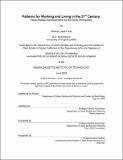Patterns for working and living in the 21st century : real estate development for the new workplace
Author(s)
Foutz, Whitney Jade
DownloadFull printable version (4.278Mb)
Other Contributors
Massachusetts Institute of Technology. Center for Real Estate.
Advisor
Dennis Frenchman.
Terms of use
Metadata
Show full item recordAbstract
Emerging mobile and digital technologies are providing individuals with greater flexibility in the way they structure their working environment. At the same time, the knowledge-based economy is growing based on ideas generated through collaborative processes. Working patterns are changing, creating a demand for physical and virtual environments that address changing preferences. The goal of this thesis is to survey and examine technology-enhanced alternatives to the old working environment that are now being developed, and to synthesize their main attributes into a set of guidelines for the creation of new real estate products. Many groups are now involved in creating such innovative alternative workplaces, but speculative real estate developers are hardly among them. Perhaps the term "real estate developer" has evolved to describe any individual or group who adapts and adds value to the built environment to meet the needs of their intended users. A Catalogue of New Workplace Typologies documents such projects at the individual, office, and neighborhood scales. At the individual scale, working environments are appropriated ad hoc and adapted to meet personal needs. New office environments are providing more services and building a sense of community through open, shared spaces. (cont.) Entire live/work/play neighborhoods are emerging as a place for interaction and the development and testing of new technologies. Developers of these new working environments are advised to consider 1) a greater focus on accessibility to information, amenities, and partnerships; 2) the mixed-use campus as a potential model for development; 3) the hybridization of both the home and the workplace; 4) the marriage of technology with the environment; 5) the intense use of space and time; and 6) the treatment of real estate as a service industry that balances risk between the developer and the client.
Description
Thesis (M.C.P.)--Massachusetts Institute of Technology, Dept. of Urban Studies and Planning; and, (S.M. in Real Estate Development)--Massachusetts Institute of Technology, Dept. of Urban Studies and Planning, Center for Real Estate, 2005. This electronic version was submitted by the student author. The certified thesis is available in the Institute Archives and Special Collections. Includes bibliographical references (p. 105-110).
Date issued
2005Department
Massachusetts Institute of Technology. Center for Real Estate; Massachusetts Institute of Technology. Department of Urban Studies and PlanningPublisher
Massachusetts Institute of Technology
Keywords
Urban Studies and Planning., Center for Real Estate.